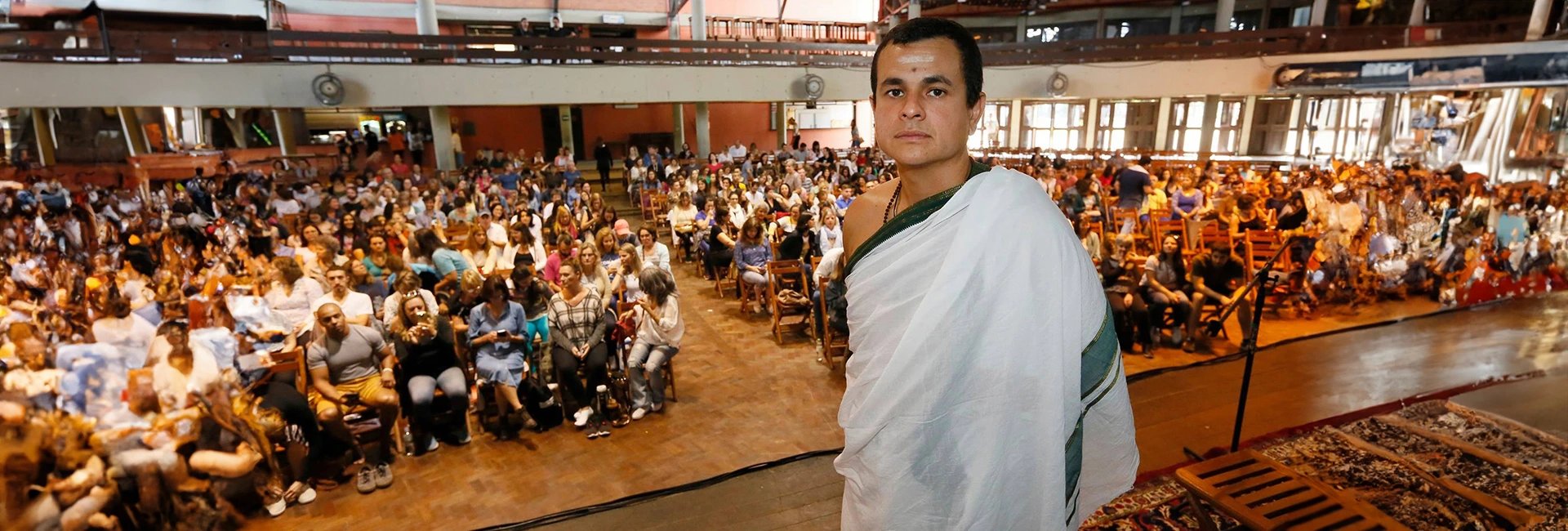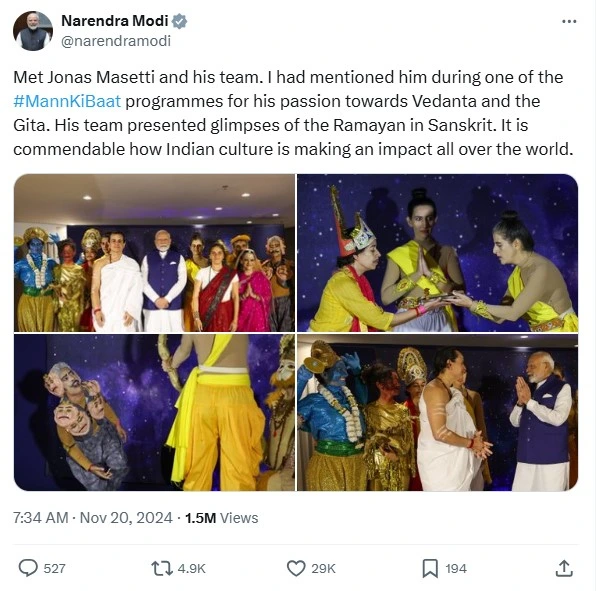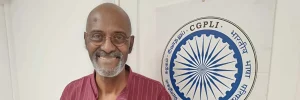(December 4, 2024) Born in Rio de Janeiro to parents of Italian and indigenous Brazilian descent, Jonas Masetti grew up with a rich multicultural heritage. His family’s modest roots in São Paulo and the Minas Gerais region instilled in him a deep connection to Brazilian traditions. However, his life took an extraordinary turn when he encountered Indian philosophy during his engineering career. What began as a search for deeper meaning evolved into a commitment to sharing Vedanta, a profound tradition of self-knowledge and spirituality, with the world.
Jonas’s work has earned global recognition, including from Indian Prime Minister Narendra Modi. In 2021, Modi mentioned Jonas in his widely followed Mann Ki Baat program, commending his efforts in popularizing the Bhagavad Gita and Vedanta among Brazilians and called him the ambassador of Vedic culture. Jonas recently met the Indian Prime Minister during the latter’s recent visit to Rio de Janeiro. On this occasion, Jonas and his team presented a captivating Sanskrit rendition of the Ramayana. Later the PM took to twitter, once again turning the world’s attention on Jonas.
Vedanta – a timeless philosophy
“My understanding is that Vedic tradition has so many tools for the well-being of humanity,” believes the Italian-Brazilian guru of Vedanta.
Vedanta is one of the schools of Indian philosophy, rooted in the teachings of the Vedas, which are ancient sacred scriptures of India. The word ‘Vedanta’ literally means “the end of the Vedas, signifying both the culmination of Vedic thought and the philosophical insights derived from the later part of the Vedas, particularly the Upanishads. Vedanta explores deep questions about the nature of reality, the self, and the ultimate purpose of life.
It offers multiple paths to self-realization, allowing individuals to align with their temperament and abilities. The paths are Jnana Yoga (path of knowledge), Bhakti Yoga (path of devotion), Karma Yoga (path of action) and Raja Yoga (path of meditation).
“When I chose Vedanta, I saw it as a means of knowledge and a tool for knowing myself. In the course, I got to learn about Indian culture and temples. I realised I belonged to that. My students are from all the religions,” remarked Jonas in an interview highlighting how Vedanta transcends religious boundaries. “You don’t have to be a Hindu to practice such things. When you go to an Ayurveda doctor, he doesn’t ask about your religion before treating you. Same way, the Vedanta teacher is not asked where you belong.”
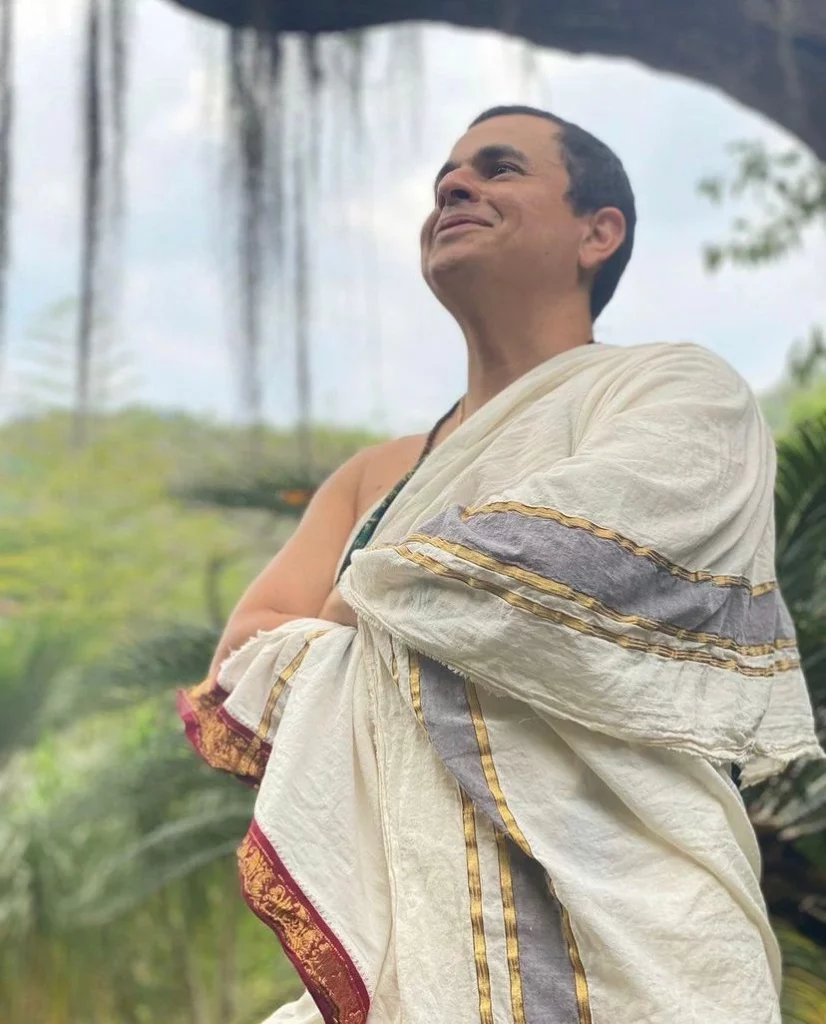
Jonas Masetti
From engineering to spirituality: A life transformed
Jonas discovered yoga and Vedanta in the early 2003 while searching for answers to a growing sense of dissatisfaction with his life, despite having a successful career as a mechanical engineer. “I had everything that a Western society needs to have. I had family, friends and money. I used to go to parties but I was not feeling fulfilled. Also, the people I knew had a lot of trouble, “he said, “I felt what the Western ideology was proposing to me wasn’t going to give me fulfilment.”
The quest to explore beyond the material world, led Jonas to meet Santosh Vallury, an Indian yogi who had recently moved to Brazil at that time. “I had the privilege and good fortune to have many one-to-one sessions with him,” Jonas recalled.
This relationship sparked Jonas’s interest in Indian spirituality and led him to the U.S. to meet Swami Dayananda Saraswati, a revered teacher of Vedanta. At an ashram in Saylorsburg, Pennsylvania, Jonas experienced the transformative power of Indian wisdom through Vedic teachings and seva (selfless service). “After that, I was very into the culture because there was a connection which I felt deeply,” he explained.
Jonas’s journey of transformation reached its peak when he enrolled in a three-and-a-half-year residential course at Arsha Vidya Gurukulam in Coimbatore. “For me, the three-year course was fundamental.” He felt as if he is a completely new person. “It was like being born again.” The immersive program shaped him into an Acharya (master) of Vedanta, and he returned to Brazil as a teacher.
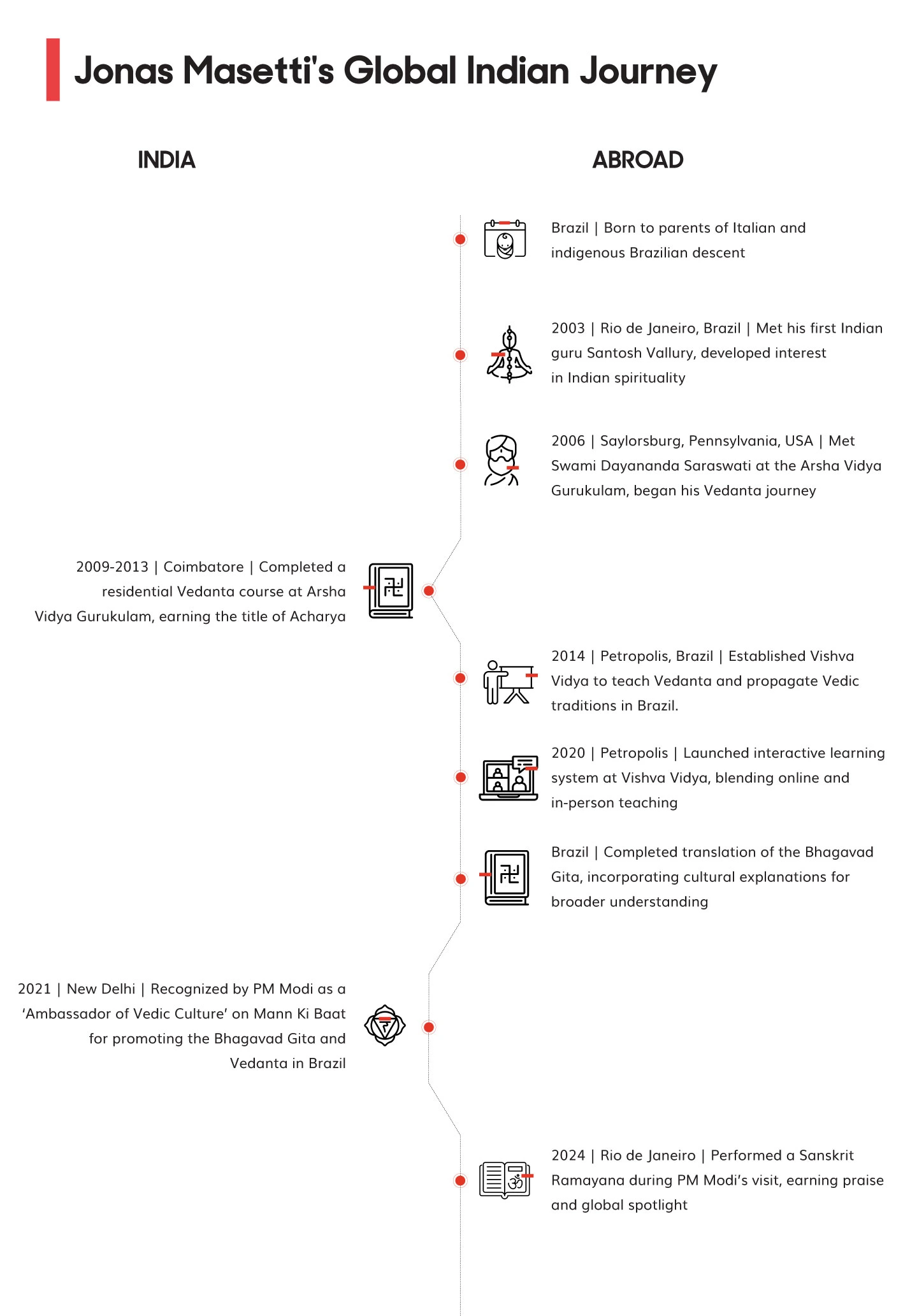
Establishing Vishva Vidya: A Vedic oasis in Brazil
In 2014, Jonas founded Vishva Vidya, an institute dedicated to preserving and sharing the teachings of Vedanta in Brazil. Located in the scenic hills of Petropolis, near Rio de Janeiro, the institute offers classes, retreats, and immersive learning experiences. Its name, meaning ‘universal knowledge’ in Sanskrit, reflects Jonas’s belief in the inclusivity of Vedic teachings.
He has also adopted a hybrid model to reach a wider audience, combining traditional in-person sessions with innovative online platforms. The interactive learning system, introduced at Vishva Vidya, replicates the experience of a classroom through cutting-edge technology. “We have four cameras and 32 monitors arranged in a U-shape so hundreds of students can interact with each other and with me in real-time,” Jonas explained.
The institute has become a hub for Brazilians seeking to immerse themselves in Indian philosophy, Sanskrit, and the Vedic tradition, creating a gated community that thrives on learning and self-discovery.
Jonas also runs an initiative called Chhatralya in Brazil meant for underprivileged students interested in receiving spiritual teachings.
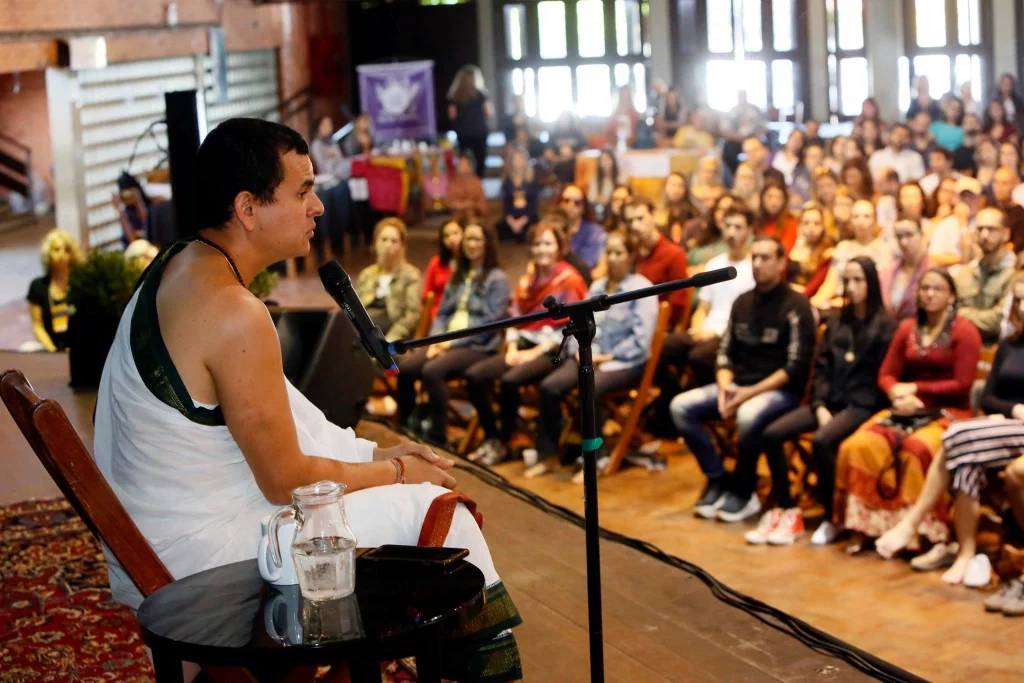
Jonas during one of his sessions
Acknowledgment by Prime Minister Modi: A global spotlight
Jonas’s efforts in popularizing Vedanta have garnered widespread recognition, including a significant mention by Prime Minister Narendra Modi in his Mann Ki Baat program in 2021. During the broadcast, Modi praised Jonas for his work in bringing the Bhagavad Gita and Indian philosophy to Brazil, calling him an ambassador of Vedic culture.
The Prime Minister introduced him to the world as the person with perhaps the largest following of Vedanta in Brazil.” During that time Jonas had 150,000 followers studying daily. “That is probably how he came to notice us, and it’s a recognition,” Jonas reflected. “Being foreigners, there is a lot of resistance. Those who choose to go on this path (of spirituality) lack a sense of belonging. For us, it was very special because we felt that we were accepted. It was a reason for a lot of joy for us.”
This recognition took on a more personal dimension during Modi’s recent visit to Brazil. At an event in Rio de Janeiro, Jonas and his team presented an awe-inspiring Sanskrit rendition of the Ramayana for the Prime Minister. The performance showcased the enduring relevance of Indian traditions in a global context. Following that, Modi took to Twitter to reaffirm Jonas’s role as an ambassador of Vedic culture, further spotlighting him.
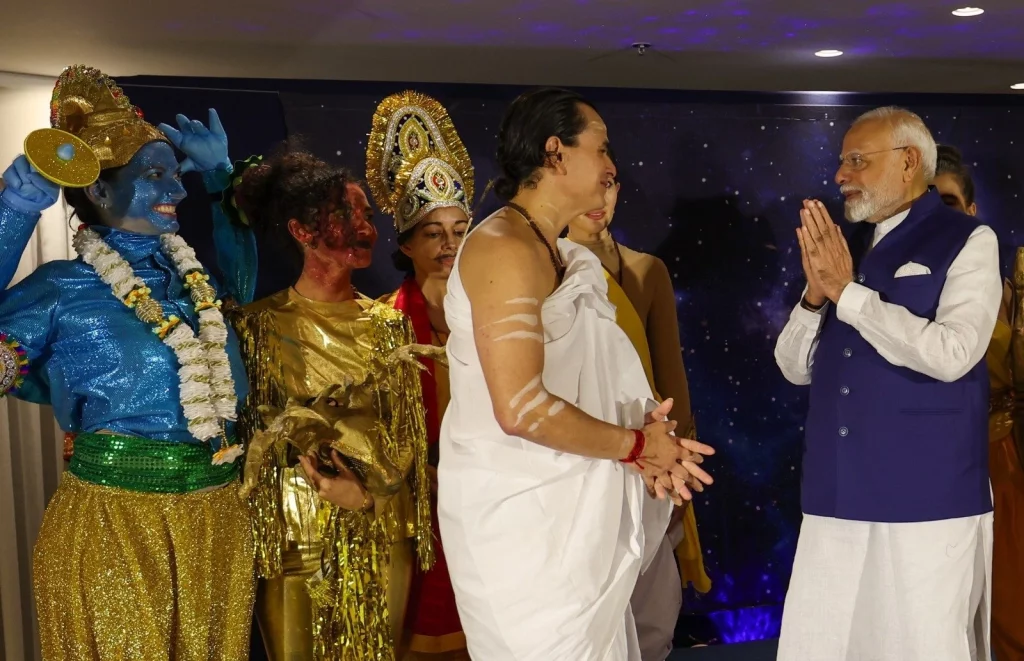
Jonas Masetti with PM Modi during the latter’s recent visit to Brazil
Translating ancient texts for modern readers
One of Jonas’s most significant contributions is his work in translating Indian scriptures. His translation of the Bhagavad Gita, completed over two and a half years, has been a meticulous effort to preserve the essence of the original text. “For every expression, I wanted the ‘original meaning’ so that the essence is not lost,” Jonas shared. For example, he added explanatory footnotes to bridge cultural gaps, comparing Kamadhenu, the wish-fulfilling cow, to Aladdin’s lamp for Western readers.
In addition to the Gita, Jonas Masetti has translated other foundational texts and plans to work on the Upanishads, ensuring that Western audiences have access to these timeless teachings. He is also an author, and the host of the podcast Vedanta Cast.
Inspiring a global movement
Through his teaching, translations, and cultural exchanges, Jonas Masetti has created a unique space where Indian and Brazilian traditions come together. His institution, Vishva Vidya has become a model for how ancient knowledge can thrive in the modern Western world, attracting students from diverse backgrounds and creating a global Vedantic community.
Jonas’s vision extends beyond teaching. He believes in the transformative power of spirituality to bring out the best in individuals and societies. He is now working to revive Brazil’s spiritual legacy, connecting it with Indian wisdom to foster a deeper understanding of universal human values.
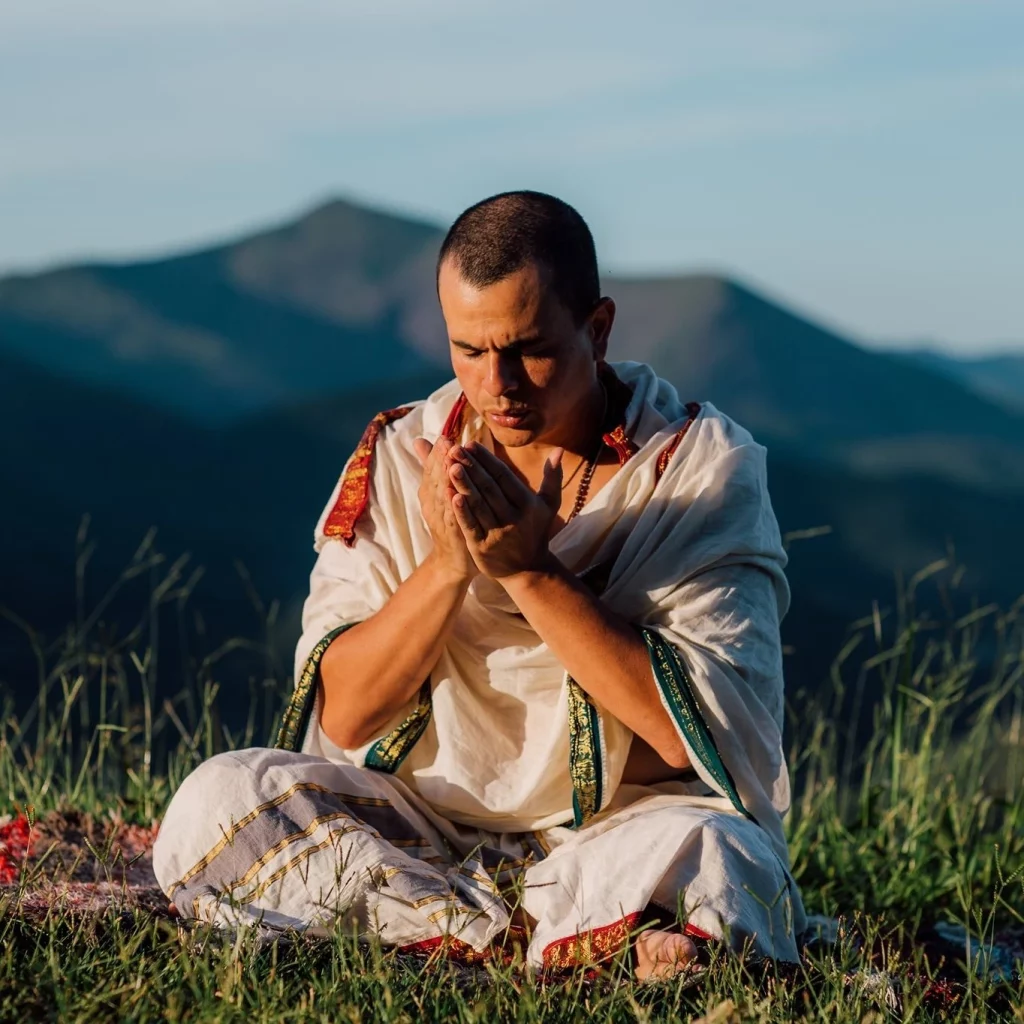
Jonas Masetti
“Our connections with fathers, grandfathers, with devatas, with nature, and everything that is available help us become the best version of ourselves and lead the world spiritually,” Jonas remarked while discussing Indian practices, a message he actively propagates.
Indian diaspora in Brazil
The Indian diaspora in Brazil is a small but dynamic community that reflects the historical ties and growing connections between the two nations. While the migration of Indians to Brazil is not as large-scale as seen in countries like the United States or the United Kingdom, their presence has been steadily growing, particularly in cities like São Paulo and Rio de Janeiro. Many Indians have settled in Brazil as professionals in fields such as information technology, engineering, research and academia. Additionally, Indian culture has left a distinct mark on Brazilian society through the popularity of yoga, Bollywood films, and Indian cuisine.
Universality of ancient Indian wisdom
Jonas’s journey from Rio de Janeiro to the ashrams of India and back is a proof of the universality of ancient wisdom. He has made Vedanta accessible to thousands in the land he comes from, proving that spirituality transcends geographical and cultural boundaries.
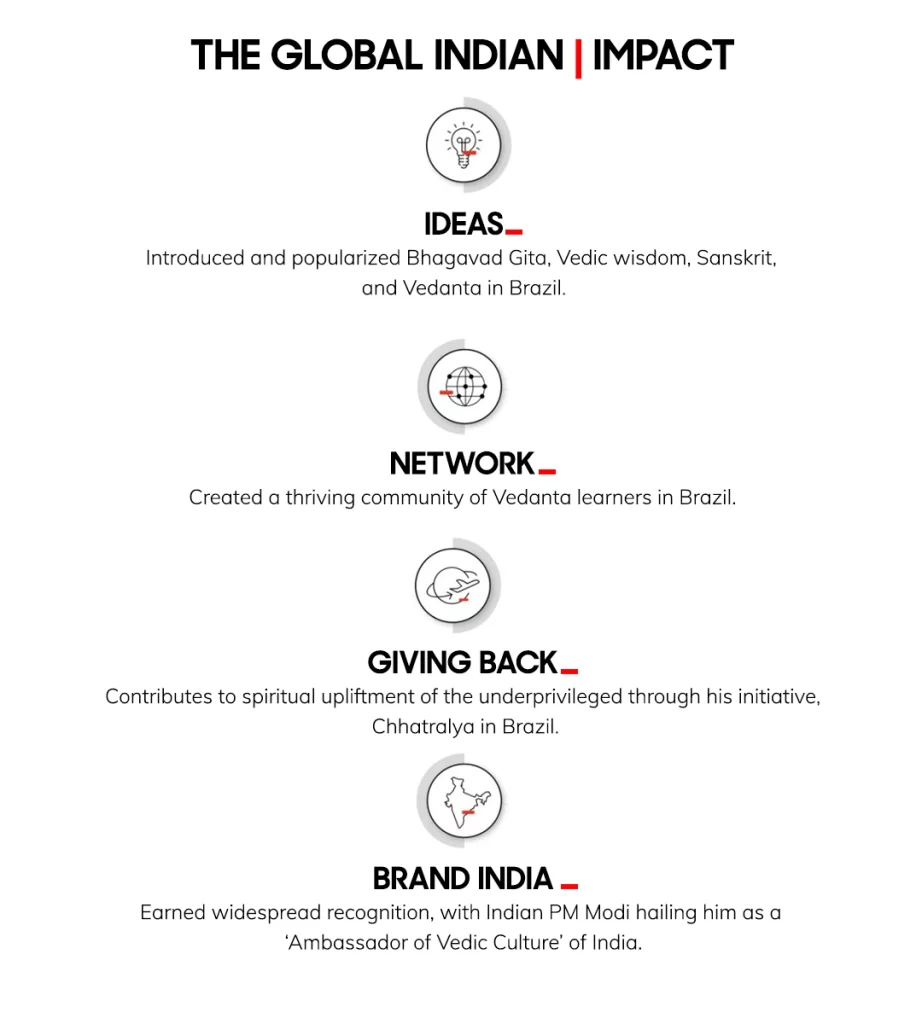
Jonas Masetti’s story is a shining example of how one individual can become a bridge between cultures. His work serves as a reminder that the search for knowledge and self-awareness is a universal endeavour, capable of uniting people across the world.
- Follow Jonas Masetti on Facebook
Read a similar story of Sharath Jois, taking yoga to the world.

